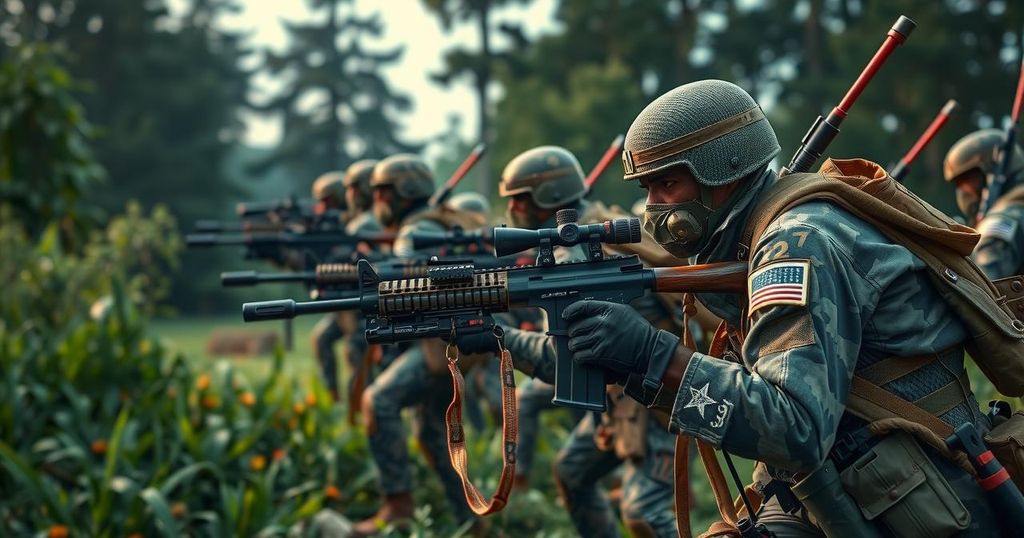Understanding the M23 Rebel Group: Beyond Mineral Control to Local Governance in Eastern DRC
The Rwandan-backed M23 rebel group in eastern DRC aims to establish local power, undermining traditional governance rather than solely seeking control over mineral resources. Historical land disputes and ongoing struggles for authority drive the conflict, necessitating a comprehensive understanding to address complex local issues. To ensure sustainable peace, engagement in dialogue and resolution of land grievances is critical.
The M23 Movement, supported by Rwanda, is often portrayed primarily as a quest for control over the mineral-rich regions of eastern Democratic Republic of Congo (DRC). The group intensified its military activities in 2021, currently dominating extensive territories in North Kivu province and strategically surrounding the city of Goma. While control over mining operations may seem a logical interpretation of M23’s motives, recent research indicates that the situation is more complex. Our interdisciplinary team of researchers has closely examined the M23 conflict from various angles, revealing that simplistic interpretations fail to consider critical historical and local contexts. Through collaboration with the Goma-based Association pour le Développement des Initiatives Paysannes, we conducted interviews with over 55 individuals directly impacted by the conflict, including members of M23 as well as local authorities, armed groups, traders, and everyday citizens. The findings indicate that M23’s strategy extends beyond merely seizing mining resources; it aims to disrupt local governance and establish a new power structure. This encompasses undermining traditional leadership, controlling key trade routes, and implementing a comprehensive taxation system. Such measures allow M23 and its Rwandan backers to generate income from the local economy, further entrenching their power without the need for direct control over mining sites. The origins of the conflict are deeply rooted in historical disputes over land, tracing back to the post-colonial landscape of DRC. Historical movements of Rwandan migrant workers during the Belgian colonial era have led to long-standing tensions between Rwandophone communities and indigenous groups over land ownership and rights. As these disputes have escalated, armed groups have offered a means to resolve land conflicts, with M23 emerging as a protector of Tutsi land claims amid rising grievances. Additionally, a pervasive struggle for authority persists, as M23 actively seeks to replace established local leaders with its appointees, resorting to violence and intimidation. The taxation practices implemented by M23 not only finance their operations but also solidify their political authority over the local populace, intertwining economic aspects of governance with military control. M23’s influence extends into the mineral economy of North Kivu, as it controls trade routes and imposes taxes on mineral exports, particularly to Rwanda. Dawning evidence points to Rwanda benefitting from M23’s actions, which counteract Uganda’s efforts to enter the Congolese market. This tense competition further complicates the need for a unified Congolese economic approach, depriving the country of necessary revenues. In conclusion, while the M23 conflict is indeed affected by local mineral resources, its origins and impact are intricately linked to historical land struggles, local power dynamics, and governance issues. To achieve lasting peace in North Kivu, it is imperative to conduct extensive local dialogues to mend inter-community relationships, resolve lingering land disputes, and address the militarization of local governance. Ignoring these deeper issues will only perpetuate ongoing tensions and instability in the region.
The conflict involving the M23 Movement in eastern DRC is often oversimplified as a battle for resource control, specifically mining sites rich in minerals like tin, tantalum, tungsten, and gold. However, historical context, including colonial legacies and ethnic tensions, plays a crucial role in understanding the underlying causes of the conflict. With Rwandan support, M23 has expanded its influence in the region, navigating complex socio-political landscapes that extend well beyond merely harvesting minerals.
The research underscores the necessity of recognizing the multifaceted nature of the M23 conflict, which includes deep-seated historical grievances and local power struggles. To foster a sustainable resolution, South Kivu must engage in community-driven dialogue to address land equity, restore customary authority, and dismantle the militarized governance model currently in place. Only through such inclusive strategies can the cycle of violence and discord be broken, paving the way for lasting peace in the region.
Original Source: www.defenceweb.co.za




Post Comment